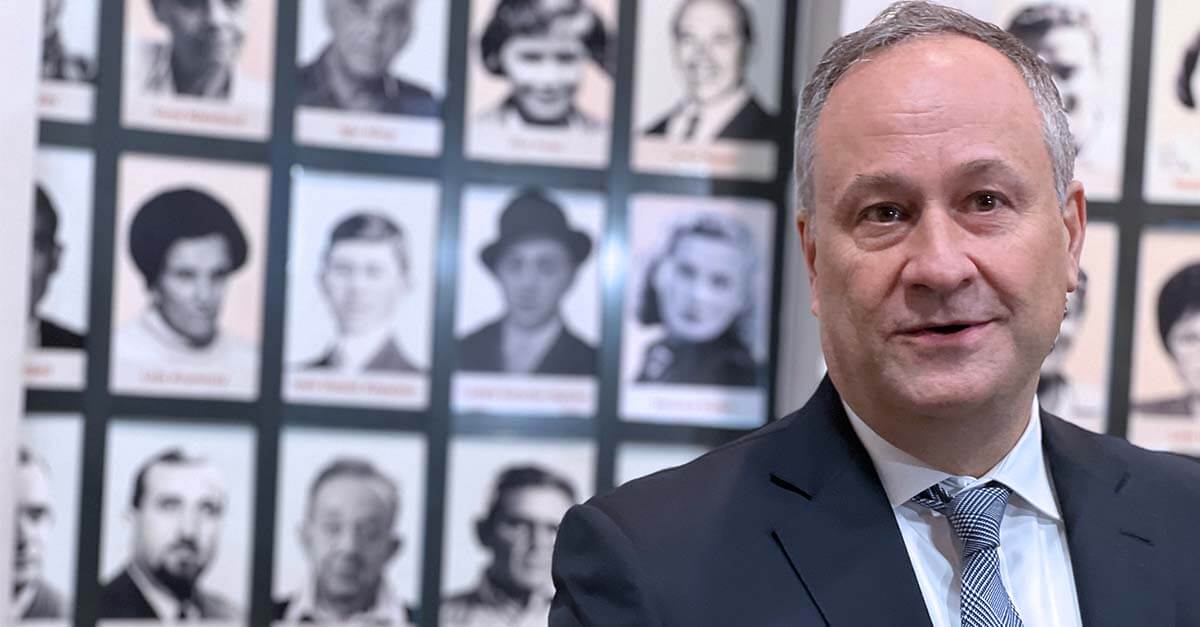Emhoff condemns synagogue attack while visiting Holocaust sites in Poland
‘What we are seeing today, we cannot have history repeat itself’

Second Gentleman Doug Emhoff at the factory in Krakow, Poland, where Oskar Schindler saved 1,200 Jews during the Holocaust Photo by Laura E. Adkins
KRAKOW, Poland — Second gentleman Doug Emhoff spoke emotionally Saturday morning about the deadly synagogue attack in Jerusalem after he toured the factory in Poland where Oskar Schindler saved 1,200 Jews.
“This is a terrorist attack. This is murder,” Emhoff told reporters gathered in Krakow.
“What we are seeing today, we cannot have history repeat itself,” Emhoff said.
Shortly before he toured the historic factory, news broke that a Palestinian teenager had shot and wounded an Israeli father and his adult son outside Jerusalem’s Old City. The victims, aged 23 and 47, were shot in their upper bodies. The victims were hospitalized and are in moderate to serious condition. Israeli officials said armed civilians shot and wounded the attacker, who was 13.
Emhoff, who is Jewish, visited the Auschwitz-Birkenau concentration camp on Friday for International Holocaust Remembrance Day and participated in a ceremony with survivors. Emhoff and his aides had Shabbat dinner with local Jewish leaders at the Krakow JCC, during which they learned of the Jerusalem attack.
On Saturday morning, Emhoff toured the enamel factory, which is now a museum, and participated in a roundtable discussion on antisemitism and tolerance issues at the Galicia Jewish Museum.
At the factory, Emhoff viewed a list of names of those saved by Schindler and wrote in the guestbook: “The story of Oskar Schindler will forever serve as a story of courage and conviction.”
Speaking to reporters afterward he condemned the synagogue attack, and said: “We stand with the people of Israel.”
“This is something that’s horrible. These were people who were just praying in a temple, living their everyday lives, and were murdered in cold blood,” Emhoff said of the Friday evening shooting outside a synagogue in Neve Yaakov, a Jewish settlement in East Jerusalem. “And it’s not acceptable. And it’s something that we need to just stop. And that’s why we’re doing this work. And that’s why I’m going to continue to do this work.”
Emhoff noted that President Joe Biden spoke with Israeli Prime Minister Benjamin Netanyahu after Friday’s attack, and said he had also talked with his wife, Vice President Kamala Harris.
“It was just a personal conversation,” he said. “More of a husband-and-wife conversation about, one talking about my trip and what I’ve seen, and talking about how horrible that terrorist attack and murder was in Israel. Just terrible.”
The synagogue attack was the deadliest in Jerusalem since 2008, and came a day after an Israeli raid on the Jenin refugee camp in the occupied West Bank left at least nine Palestinians dead, including a 60-year-old woman. Israeli officials said the troops were aiming to arrest militants planning a major attack on Jews.
At the Galicia Jewish Museum on Saturday, Emhoff spoke personally and powerfully about the scourge of antisemitism and the importance of studying the history of European Jewry and its decimation in the Holocaust.
“As the first Jewish spouse of a United States president or vice president, I know this visit has a special significance — for me, for our administration, and for Jews around the world,” he said. “My great-grandparents fled persecution in Poland 120 years ago. I am here because they were able to leave. Yet, so many others were not.”
Emhoff said he feels “a deep connection to all those who perished in Auschwitz,” and that his visited to the camps “was an incredibly solemn and sad experience but, it also reminds us why the work we are doing is so important.”
“Given the rise in antisemitism, it is important for me — and for all of us — to put a spotlight on the history of Jews in Europe,” he said. “We know that in some cases knowledge about the Holocaust among young people is vague or nonexistent. We must find new ways to remember and educate the next generation about the horrors of the Holocaust. To tell the testimonies of survivors. To remember the stories of those that perished. And work to ensure ‘Never Again.’”















